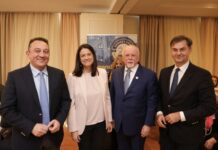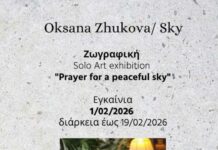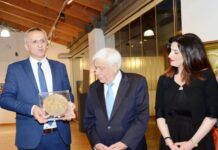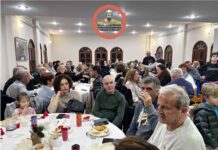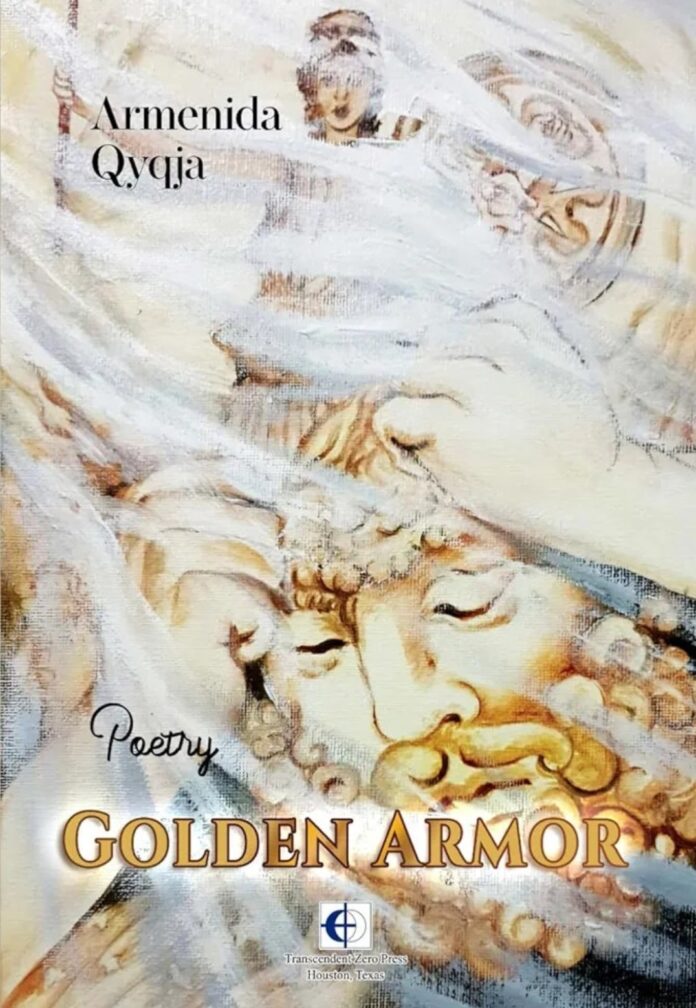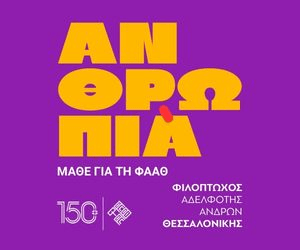By Inga Zhghenti
Επιμέλεια: Εύα Πετροπούλου Λιανού
My latest article on contemporary Georgian poetry titled Where Does Georgian Poetry Stand Today? looks at the modern poetic voice of Georgia. I would apply the same question to any poetry of today—in this world of constant changes with dramatically turbulent technological aspirations which still a failure to prioritize and secure peace.
After reading Golden Armor, the poetry collection by Tirana-born Armenida Qyqja, I would rather generalize my question: “Where does poetry stand today?” The answer would be: “At the crossroads” of physical and spiritual uncertainties and escalations, making up the blood and body of any real poetry. These uncertainties and escalations are inseparable constituents of the book Golden Armor as it captures the most intimate and relatable journeys of searching the idea of “the self,” the unattainability and vulnerability of happiness, the unavoidability of fate, and the determined void and futility of the contemporary world dictated by consumerism, fabricated reality, and promulgated injustice, all juxtaposed with the concerns conditioned by the realization and recognition of life’s absurdity.
The lyrical hero narrates the stories through emotions where physical and spiritual quests and pains interweave and intermix without borders. The voice speaking up in different poems exposes the feelings of alienation, loneliness, emptiness, and imperceptible and evasive time. The lines of the poems manifest alienation as both psychological and physical exile.
In the poem “Sons and Daughters of Pragmatism,”the poet calls us “the sons and daughters of pragmatism” who “wink an eye at our own image in the mirror and run along.” The passage sets the scene of individuals escaping from their reflections and perceptions, thus demonstrating quite common detachment from the self of nowadays.
The poem “They Say” also explores unrecognized alienation and emptiness reflected in the mirror. In the first two lines, the piece delivers a vivid image of existential isolation: “I’ve been hiding from myself for a long time, I hide from that emptiness that can’t be seen in a mirror,” somehow reminiscent of Sartrean nausea. The existential plights are further outlined in the poems “Waiting to Hear Your Voice” and “Somewhere, Near the Heart,” where emotional longing for the loved one’s presence and somewhat Beckettean absurdism are interspersed.
The poet’s figurative stance finds particular comfort in juxtaposing images. Therefore, love and war are explored side by side, thus stipulating the fortuitousness and illogicality of events. In “Bitter Thoughts,” the concept of love faces the threat of destruction in wartime. On the other hand, the gratitude for not being born in a war-torn land is tinged with survivor’s guilt. The poet exposes the tragedy of war and the fatality of love through the destruction of Gaza and Ukraine.
Undated Battles also envisions the theme of love and war through the lens of violence. This retrospect might be alluding to T.S. Eliot’s representation of the fragmented nature of human existence in chaotic times. Although the self of the lyrical hero is broken, deconstructed, and fragmented by the challenges of existence, there remains a constant yearning for meaning and redemption in the quest the hero reveals.
The poems “Come Closer,” “Find Me,” and “When You Shall Arrive” still find it meaningfully worth striving to reconcile with the self. In “Come Closer,” the power of love is seen as a bridging domain in existential voids, thus somehow resonating with Rainer Maria Rilke’s notion of love being challenging but yet a necessary “confrontation” with another soul.
One more significant focus of the poetry collection by Armenida Qyqja is the struggles of the fragmented and dismantled self in the materialized universe guided by social media and the futility of its content. “Mental Paralysis” communicates criticism about the superficiality of social media, assessing it as an anesthetic silencing of independent reasoning, quite similar to George Orwell’s warnings declared in his novel 1984.
Spiritual decay and consumerism are condemned in “Mercenaries of Chaos,” in this sense resonating with Jean Baudrillard’s theories on hyperreality, where reality is replaced by fabricated spectacle. The poem diagnoses the modern world by anorexia, both spiritual and modern:
Spiritual and mental anorexia,
that has no cure, no stimulus,
the most evil chronic condition
is going to wipe out the human race
at a much higher rate
than all viruses created in labs.
But still, there is a belief that
this darkness shall pass,
its curtains won’t be able to restrain the sun forever,
close your eyes and see with the light (For the strong…)
The entire trajectory of the words in the book replays the inner voice of the human, attacked by the destructive nature of existence exposed through wars, hatred, emptiness, absurdity, and the fatality of life. Nevertheless, the author does not kneel to all these challenges stipulated by life’s nature but stands up to overcome them all through longing for the voice of love and survival, as the mythological Greek king Sisyphus stands against fate through his relentless attempts admired throughout the centuries.
BIO: Armenida Qyqja was born in Tirana, Albania in 1977 and immigrated to Canada in 1995. She is the author of eight poetry books and two books of short stories. Her most recent book is Golden Armor, a poetry collection published by Transcendent Zero Press (Texas, USA 2025).
Reviewer bio: Dr. Inga Zhghenti is a Fulbright Scholar, translator, and literary scholar whose work bridges Georgian and American cultures. She has translated Samuel Beckett, Louise Glück, Emily Dickinson, John Updike, Diane di Prima, and leading Georgian poets, with publications in the international poetry platform Versopolis, Georgia’s leading literary journal Arili, and Upsala Literature Magazine (Sweden). Active as a reviewer, editor, and cultural advocate, she is a Visiting Professor of English at DeVry University, teaching Composition and Advanced Composition, and directs Language Arts at the Georgian-American Cultural Center Dancing Crane in New York. She speaks internationally on literature, translation, and identity, advancing dialogue across languages and cultures through scholarship and creativity.






